In this article:
Psoriasis is caused by an autoimmune disorder that accelerates the growth of skin cells, resulting in their buildup. As a result, dry red patches and silvery scales develop on the skin and cause itching. This chronic condition can affect both genders at any age, though adults more frequently.
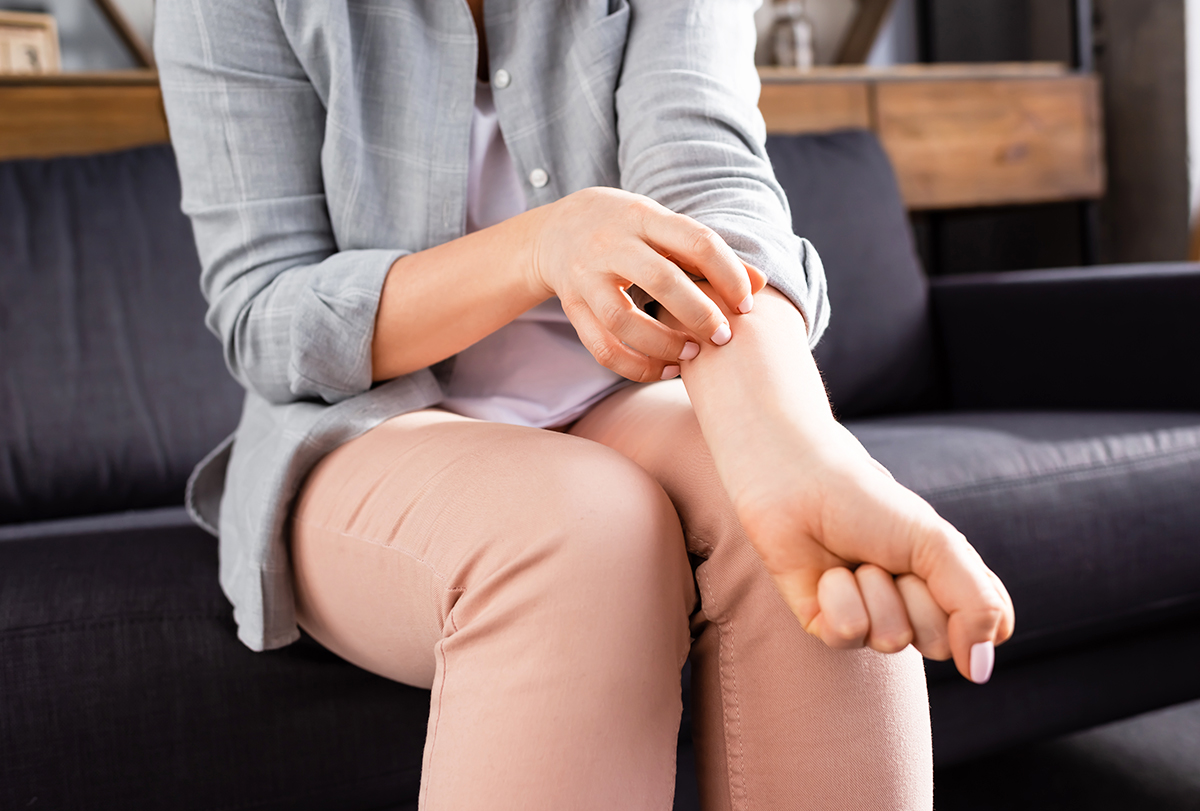
Psoriasis primarily affects the surface of the skin but it can also increase the tendency for other health complications, such as psoriatic arthritis, heart complications, and depression, to name a few.
How Common Is Psoriasis?
Psoriasis is a widespread disease that can affect people of all age, gender, or ethnicity. It is a global problem with incidence rates varying from 0.09% to 11.4% among different countries, according to published data. (1)
The disease is highly prevalent in the polar regions. However, it is also common in tropical/subtropical countries such as India due to the dense population. Studies report that the rate of occurrence of psoriasis may increase in the near future. (2)
Types of Psoriasis
Psoriasis is of various types, each of which affects different body parts and also differs in symptoms. The common types of psoriasis include the following:
1. Plaque psoriasis
Plaque psoriasis is the most prevalent kind of psoriasis. It usually affects the elbows, knees, lower back, and/or scalp region but can affect any area of the skin. The formed plaques are painful and itchy and can bleed due to the cracking. Plaque psoriasis is a chronic but manageable condition.
However, it can be hard to manage as response rates to treatment vary largely and the condition is chronic with flare-ups and periods of well-controlled disease.
2. Guttate psoriasis
Guttate psoriasis is characterized by the formation of multiple small plaques on the trunk and proximal limbs (usually the thigh and upper arm region) and scaly skin. It has a sudden onset and, in a few days, covers large areas with small red scaly plaques and some scattered lesions.
Guttate psoriasis may also form on the scalp, ears, and face, but the lesions that develop in these areas are light and disappear quickly. This is commonly triggered by an infection, most commonly strep throat.
3. Pustular psoriasis
The formation of pus spots on reddened areas of the skin is characteristic of pustular psoriasis. The pus spots may look infectious, but they are only due to the accumulation of white blood cells and are neither infectious nor contagious.
Pustular psoriasis can be triggered by medications in a patient with a history of plaque psoriasis, but this condition requires more aggressive treatment and hospitalization.
4. Inverse psoriasis
The formation of scaly plaques in skin folds is known as inverse psoriasis. This condition usually affects the groin, buttock creases, axillae, and folds under the breasts. As the scales fall off due to skin-on-skin friction and heat, the affected areas appear smooth, shiny, and red, similar to scalded skin.
5. Erythrodermic psoriasis
The development of a red rash and inflammation all over the body is symptomatic of erythrodermic psoriasis. This condition may occur due to stress conditions caused by fever, infection, or any illness that affects the whole body.
The redness in the skin may be accompanied by extreme itching, fast heartbeat, pain, and incapability to maintain the temperature of the body.
What Causes Psoriasis?
Psoriasis can occur due to problems in the immune system and certain genetic factors.
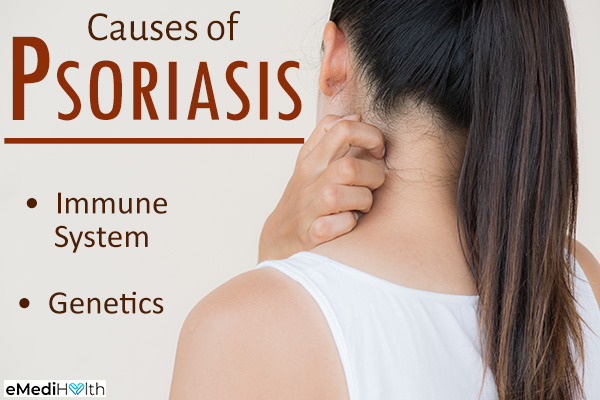
1. Immune system
An overactive immune system may cause an increase in the activity of T-helper lymphocytes, a type of white blood cells. This results in an abundance of cytokine molecules that are responsible for signaling between cells during an immune response. Cytokines direct immune cells (toward the site of action) and cause inflammation.
When the immune response targets the skin, it causes the widening of blood vessels, accumulation of white blood cells, and an increase in the division of keratinocytes (cells that produce keratin and make up a major part of the outer epidermal layer of the skin). As a result, the skin turns red, thickens, and swells up.
In psoriasis, the life cycle of keratinocytes, which is typically 1 month-long gets completed within 3–5 days due to the overproduction of cytokines. Consequently, the keratinocytes that matured early shed in the form of silvery scales.
2. Genetics
Some people are genetically predisposed to developing psoriasis. You are at a greater risk of developing psoriasis if the condition runs in your family. But only 2%–3% of the people who inherit the psoriasis gene actually develop the condition, according to the National Psoriasis Foundation (NPF).
3. Other contributing factors
Infection, medications, trauma, or injury to the skin (referred to as Koebnerization), stress, smoking, excessive alcohol consumption, and vitamin D deficiency.
Symptoms of Psoriasis
Psoriasis can affect any area of the skin, but the most commonly affected areas are the elbows, knees, and scalp. It may produce the following symptoms:
- Red patches on the skin
- Rough, flaky, and scaly skin
- Dry skin that may bleed from cracks
- Burning or stinging sensation in the skin
- Fissures
- Small bumps
- Rash
- Peeling of the skin, itchiness
- Stiffness, pain, and swelling of the joints
- Patches on the scalp
- Discolored, thickened, and pitted nails
Medical Treatment for Psoriasis
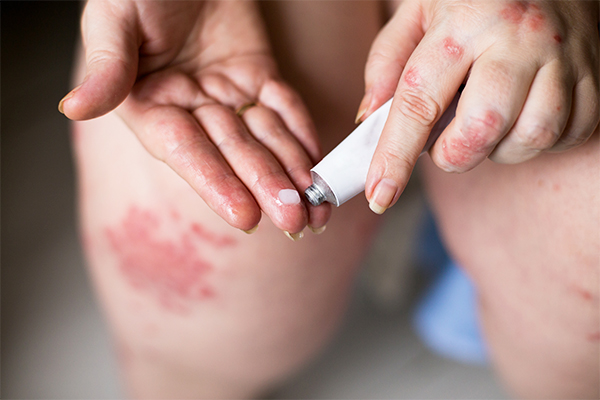
Several treatment methods are available for psoriasis. The treatment option is selected according to the surface area covered, the body part affected, and the severity of the disease.
The treatments may have varying effects on different people and are broadly classified into the following three categories:
1. Topical treatment
Topical treatment includes ointments, lotions, and creams that are directly applied to the skin. The medications may be available in the form of moisturizers, vitamin D creams, prescription corticosteroids, retinoids, or shampoos containing coal tar or salicylic acid.
2. Light therapy (phototherapy)
Light therapy (phototherapy) involves the use of ultraviolet (UV) light to effectively treat skin conditions such as psoriasis. The affected skin is exposed to controlled doses of UV light (under medical supervision), which helps in slowing down cell growth.
In severe cases, light therapy may include laser therapy (excimer laser) or a combination of UV light and topical or medicinal treatments.
3. Oral/injected medications
Oral or injected medications may be required along with topical treatment to manage moderate to severe psoriasis and to treat and prevent joint damage with psoriatic arthritis.
Diagnosing Psoriasis
Any primary care doctor can diagnose psoriasis by analyzing its signs and symptoms. However, psoriasis can resemble other skin problems such as eczema, in which case a dermatologist can provide a proper diagnosis.
The diagnosis can be confirmed using the medical history of the patient and a skin biopsy. A skin biopsy involves removing a small piece of affected skin to be observed under a microscope. The results also help in determining the kind of treatment to be given.
Risk Factors for Psoriasis
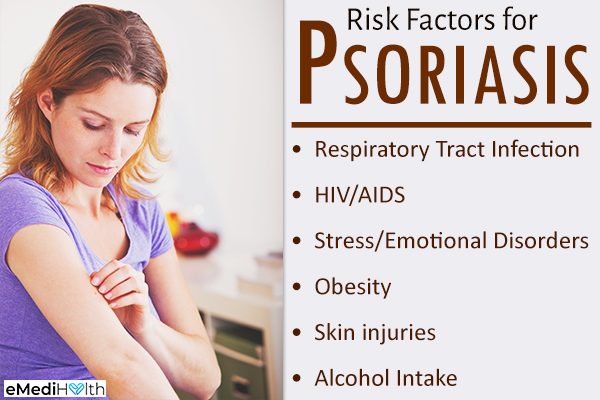
Medical conditions and factors that may trigger psoriasis include the following:
1. Infection
Sinusitis, strep throat, tonsillitis, and other respiratory tract infections may cause psoriasis flare-ups.
2. HIV/AIDS
Psoriasis may become severe in people with HIV/AIDS.
3. Stress/emotional disorders
The inflammation may increase due to the chemicals released during mental stress, causing flare-ups.
4. Obesity
Some scientific studies associated obesity with the onset of psoriasis. It can also aggravate existing psoriasis, and losing weight may help in managing the skin condition. (3)
5. Skin injuries
The site of an abrasion, burn, cut, or injection, where the skin is injured, may be affected by psoriasis. This delayed occurrence of psoriasis is called the Koebner phenomenon.
6. Alcohol
There are some studies that suggest that excess alcohol intake can make you more susceptible to psoriasis. However, the evidence is not too conclusive. Nevertheless, you should limit your alcohol intake just to be on the safer side and avoid it completely during psoriasis flare-ups. (4)(5)
Complications Associated With Psoriasis
Psoriasis, especially when left untreated, can lead to the following complications:
1. Psoriatic arthritis
The inflammation of the joints (arthritis) accompanied by psoriasis is known as psoriatic arthritis, which affects nearly 10%–30% of all psoriasis patients.
The symptoms include redness, stiffness, and pain in joints and heat and swelling in the surrounding tissues, often giving the toes and fingers a “sausage-like” appearance (dactylitis).
2. Nail psoriasis
Defects in the nail, such as pitted surface, crumbling, ridges, thickening, and lifting, indicate nail psoriasis, which occurs in the wake of psoriatic arthritis.
3. Mental disorders
The unusual appearance of the skin due to psoriasis may negatively affect the patient’s quality of life and self-esteem, leading to mental disorders such as depression, anxiety, substance abuse, and sexual disorders. (6)
4. Parkinson’s disease
Psoriasis may cause chronic inflammation of the neuronal tissue and may lead to the development of Parkinson’s disease. (7)
5. Cardiovascular disease
Patients with psoriasis are prone to developing cardiovascular problems and stroke.
6. Type 2 diabetes
Studies report that psoriasis may be associated with insulin resistance and an increased risk of diabetes mellitus (DM), which is a contributor to cardiovascular problems that occur with psoriasis. (8)
7. Eye disease
Psoriasis increases the risk of inflammation in the eye’s middle layer and may cause uveitis.
8. High blood pressure
Psoriasis is found to induce conditions of high blood pressure in patients. The blood pressure may increase with the severity of the skin condition. (9)
9. Autoimmune diseases
An overactive immune response associated with psoriasis increases the risk of developing other autoimmune disorders such as sclerosis, celiac disease, and Crohn’s disease (inflammatory bowel disease). (10)
When to See a Doctor
It is recommended to make an appointment with a dermatologist at the earliest upon recognizing the signs and symptoms associated with psoriasis for proper treatment.
If you have already been diagnosed with psoriasis, you may need to seek further medical help in the following cases:
- You have a flare-up.
- You want to conceive or are pregnant.
- The treatment is not having any effect.
- You experience pain or discomfort in the joints (symptoms of psoriatic arthritis).
Expert Answers (Q&A)
Answered by Dr. Michelle Levy, MD (Dermatology)
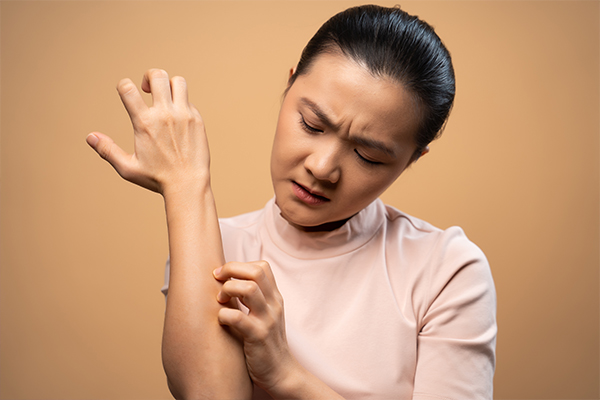
No, unfortunately, there is no cure for psoriasis at this time. However, there are many new and effective treatments that can adequately control the disease in most people.
There is no scientific proof that avoiding dairy will improve or prevent psoriasis.
Psoriasis is a chronic inflammatory skin condition that cannot be prevented since it runs in your genes.
A minority of the time, psoriasis may be triggered or worsened by streptococcal infections or by certain medications. Reducing the risk of streptococcal infections may reduce the risk of a form of psoriasis known as guttate psoriasis.
For those with psoriasis, it is probably best to avoid smoking, limit alcohol consumption, and maintain healthy body weight to reduce the intensity and frequency of flare-ups.
That depends on both the nature of someone’s psoriasis and the treatment being used. People using topical medications for their psoriasis may start to see improvement within 1–2 weeks. However, thick plaques of psoriasis may take significantly longer to clear (or require different treatments).
Systemic medications (those taken internally) vary significantly in how quickly they work and how effective they are.
Some newer injectable medications for psoriasis will result in significant improvement in as little as two weeks, while other medications or light treatments may take up to 2–3 months.
During the day, we are kept busy with our jobs and activities. These often serve to distract us from symptoms such as pruritus (itch). At night, people are no longer distracted and more likely to notice symptoms, which is why many people find that itch gets worse in the evenings.
Symptoms of psoriasis are unpredictable and may worsen or improve at any time. The worsening of symptoms is not specifically a result of aging but is due to the disease process itself.
Psoriasis is in no way contagious and does not ‘spread’ in the traditional sense of the word.
Psoriasis may flare or worsen and involve more of a person’s skin at some points in their lives, but this increased degree of involvement is not a result of contagion.
Some areas of the body are more likely to develop psoriasis plaques. These include the scalp, elbows, knees, and tailbone area. That being said, psoriasis can affect virtually any part of the skin.
About Dr. Michelle Levy, MD: Dr. Levy is a board-certified dermatologist with 15 years of experience. She is privately practicing medical and cosmetic dermatology in Toronto, Canada.
Final Word
While psoriasis cannot be completely cured, it can be managed with the help of the recommended treatments. Flare-ups can be prevented by taking measures to avoid triggers.

- Was this article helpful?
- YES, THANKS!NOT REALLY



